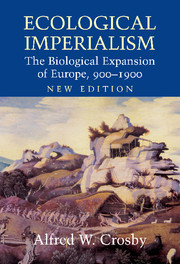Book contents
- Frontmatter
- Dedication
- Introduction
- Contents
- List of illustrations
- Preface to the new edition
- Acknowledgements
- 1 Prologue
- 2 Pangaea revisited, the Neolithic reconsidered
- 3 The Norse and the Crusaders
- 4 The Fortunate Isles
- 5 Winds
- 6 Within reach, beyond grasp
- 7 Weeds
- 8 Animals
- 9 Ills
- 10 New Zealand
- 11 Explanations
- 12 Conclusion
- Appendix: What was the “smallpox” in New South Wales in 1789?
- Notes
- Index
1 - Prologue
Published online by Cambridge University Press: 05 August 2013
- Frontmatter
- Dedication
- Introduction
- Contents
- List of illustrations
- Preface to the new edition
- Acknowledgements
- 1 Prologue
- 2 Pangaea revisited, the Neolithic reconsidered
- 3 The Norse and the Crusaders
- 4 The Fortunate Isles
- 5 Winds
- 6 Within reach, beyond grasp
- 7 Weeds
- 8 Animals
- 9 Ills
- 10 New Zealand
- 11 Explanations
- 12 Conclusion
- Appendix: What was the “smallpox” in New South Wales in 1789?
- Notes
- Index
Summary
Give me a condor's quill! Give me Vesuvius' crater for an ink stand! Friends, hold my arms!
—Herman Melville, Moby DickEuropean emigrants and their descendants are all over the place, which requires explanation.
It is more difficult to account for the distribution of this subdivision of the human species than that of any other. The locations of the others make an obvious kind of sense. All but a relatively few of the members of the many varieties of Asians live in Asia. Black Africans live on three continents, but most of them are concentrated in their original latitudes, the tropics, facing each other across one ocean. Amerindians, with few exceptions, live in the Americas, and nearly every last Australian Aborigine dwells in Australia. Eskimos live in the circumpolar lands, and Melanesians, Polynesians, and Micronesians are scattered through the islands of only one ocean, albeit a large one. All these peoples have expanded geographically – have committed acts of imperialism, if you will – but they have expanded into lands adjacent to or at least near to those in which they had already been living, or, in the case of the Pacific peoples, to the next island and then to the next after that, however many kilometers of water might lie between. Europeans, in contrast, seem to have leapfrogged around the globe.
- Type
- Chapter
- Information
- Ecological ImperialismThe Biological Expansion of Europe, 900–1900, pp. 1 - 7Publisher: Cambridge University PressPrint publication year: 2004



